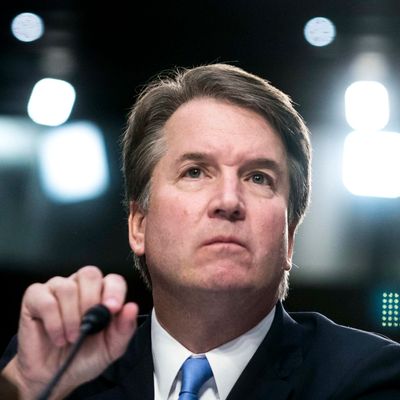
From the moment Anthony Kennedy retired, Brett Kavanaugh’s Supreme Court nomination appeared to be a foregone conclusion. It appears to be in doubt now that Christine Blasey Ford has provided a detailed account to the Washington Post of her allegation that Kavanaugh attempted to rape her as a teenager.
Ford’s story is highly credible. It contains as much detail as could be expected of an incident that took place three and a half decades ago, and there is no doubt that she and Kavanaugh shared a broad social circle. She reached out to the Post before Kavanaugh was nominated, refuting the notion that she is part of some desperate last-ditch effort to derail his nomination. She submitted to a polygraph test with an FBI agent and passed, and while polygraph tests have questionable value, a person who was making up an accusation would probably not want to offer to take one.
What compounds the potential damage of this story is the clarity of Kavanaugh’s response to the Post: “I categorically and unequivocally deny this allegation. I did not do this back in high school or at any time.” The allegation itself left at least some opening for Kavanaugh to minimize or defend his behavior:
She alleges that Kavanaugh — who played football and basketball at Georgetown Prep — held her down with the weight of his body and fumbled with her clothes, seemingly hindered by his intoxication. Judge stood across the room, she said, and both boys were laughing “maniacally.” She said she yelled, hoping that someone downstairs would hear her over the music, and Kavanaugh clapped his hand over her mouth to silence her.
At one point, she said, [Kavanaugh’s friend Mark] Judge jumped on top of them, and she tried unsuccessfully to wriggle free. Then Judge jumped on them again, toppling them, and she broke away, she said.
Kavanaugh might have confessed to the episode, and tried to argue that he was playing a joke or horsing around and did not attend to follow through on the rape attempt. But his statement closes off any such defense. He is implicitly conceding Ford’s interpretation of the episode and hanging everything on his denial that anything of the sort ever occurred.
One obvious historical precursor to the episode is the confirmation of Clarence Thomas, who unequivocally denied Anita Hill’s account of sexual harassment. Conservatives continue to treat Thomas as the innocent victim of a smear campaign, despite the voluminous evidence of his guilt that emerged after his confirmation. The most likely outcome is that Republicans would confirm a second probable perpetrator of sexual assault to the high court.
On the other hand, it’s not hard to imagine other possibilities. The Senate Republican majority can stand to lose only two votes, and still has a handful of moderates. Retiring GOP Senators Jeff Flake and Bob Corker have spoken out against Trump, yet have not taken any opportunities to give their misgivings concrete form. The Kavanaugh nomination would be such a moment, a symbolic do-over for the party’s willingness to elect Trump even after tapes of his confessions of sexual assault became public. [Update: Both Flake and Corker have now called for a delay in confirming Kavanaugh until the allegation can be further investigated.]
Perhaps more promisingly, Maine’s Susan Collins and Alaska’s Lisa Murkowski require some moderate and Democratic support for their reelections. The pressure to vote against Kavanaugh from female voters, who are already highly mobilized against Trump, might ramp up. They might also be unwilling to stomach the appointment of a credibly accused attempted rapist by a confessed sexual assault perpetrator, especially given that it may well lead to a historic constriction of women’s sexual autonomy.
The White House’s response to the allegation raises the cultural stakes of the fight. “A lawyer close to the White House” tells Politico not only that Kavanaugh will not be withdrawn, but that his confirmation represents a higher cause: “No way, not even a hint of it. If anything, it’s the opposite. If somebody can be brought down by accusations like this, then you, me, every man certainly should be worried.” It’s perfectly obvious why Donald Trump would be eager to defend the principle that men must not have their careers derailed by accusations of sexual assault. It’s less clear that 50 Republican senators will be eager to join him.
At minimum, it seems likely that additional hearings will need to be scheduled to explore the truth of the allegation. More evidence could come to light. And Republicans may not want spend the run-up to an election litigating an allegation that further defines their Trump-era identity as the party of unbridled male sexual entitlement. But at the moment, a question that appeared closed is suddenly very much open.






























